Intro
Calculate your babys arrival with our Pregnancy Due Date Calculator, estimating gestation period, conception date, and birth date, using LMP, ultrasound, and fertility windows for accurate predictions.
Pregnancy is a life-changing experience for many women, and calculating the due date is one of the most exciting and anticipation-filled moments. A pregnancy due date calculator is a tool that helps expectant mothers estimate the birth date of their baby. This calculator uses the date of the last menstrual period (LMP) or the date of conception to predict the due date. Knowing the due date is essential for prenatal care, preparing for the baby's arrival, and making necessary arrangements.
The importance of calculating the due date cannot be overstated. It helps healthcare providers monitor the pregnancy's progress, identify potential complications, and plan for interventions if needed. Moreover, knowing the due date allows expectant parents to prepare emotionally, financially, and logistically for the arrival of their baby. With the due date in mind, parents can plan for maternity leave, childcare, and other essential arrangements.
In recent years, pregnancy due date calculators have become increasingly popular, and their accuracy has improved significantly. These calculators use complex algorithms to take into account various factors that can affect the due date, such as the length of the menstrual cycle, the date of conception, and the baby's gestational age. While these calculators are not 100% accurate, they provide a reliable estimate of the due date, giving expectant parents a sense of anticipation and excitement.
Pregnancy Due Date Calculator: How It Works
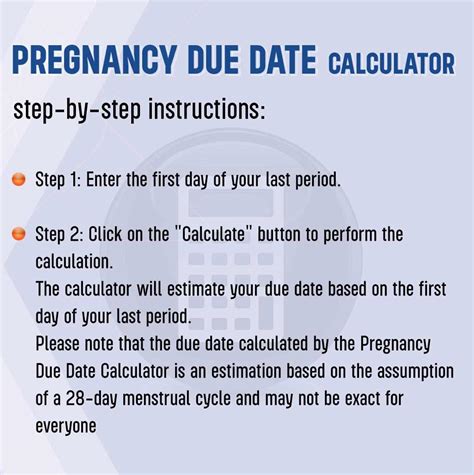
A pregnancy due date calculator works by using the date of the LMP or the date of conception to estimate the due date. The calculator assumes that the average menstrual cycle is 28 days long and that ovulation occurs on day 14. Based on this information, the calculator can estimate the due date. There are several types of pregnancy due date calculators available, including online calculators, mobile apps, and paper-based calculators.
Types of Pregnancy Due Date Calculators
There are several types of pregnancy due date calculators available, each with its own unique features and benefits. Some of the most common types of calculators include: * Online calculators: These calculators are available on websites and can be accessed from anywhere with an internet connection. * Mobile apps: These calculators are available on mobile devices and can be downloaded from app stores. * Paper-based calculators: These calculators are available in paper form and can be used manually.Benefits of Using a Pregnancy Due Date Calculator
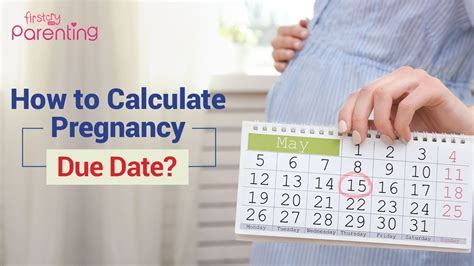
Using a pregnancy due date calculator has several benefits, including:
- Accurate estimation of the due date
- Improved prenatal care
- Better preparation for the baby's arrival
- Reduced anxiety and stress
- Increased sense of anticipation and excitement
How to Use a Pregnancy Due Date Calculator
Using a pregnancy due date calculator is relatively simple. Most calculators require the user to input the date of the LMP or the date of conception. The calculator then uses this information to estimate the due date. Some calculators may also require additional information, such as the length of the menstrual cycle or the baby's gestational age.Pregnancy Due Date Calculator: Factors That Affect Accuracy
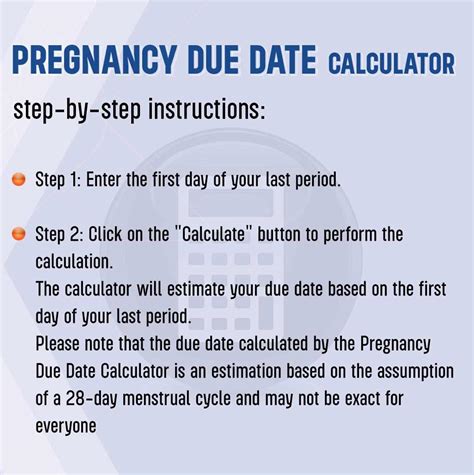
There are several factors that can affect the accuracy of a pregnancy due date calculator, including:
- Irregular menstrual cycles
- Conception date uncertainty
- Gestational age uncertainty
- Multiple pregnancies
- Previous pregnancies
Limitations of Pregnancy Due Date Calculators
While pregnancy due date calculators are generally accurate, they are not 100% reliable. There are several limitations to these calculators, including: * Assumptions about menstrual cycle length and ovulation * Limited information about individual factors that can affect the due date * Potential for user errorPregnancy Due Date Calculator: Tips for Expectant Parents
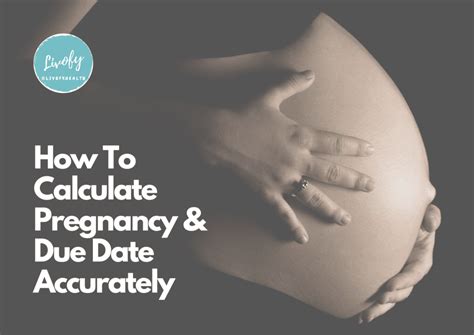
For expectant parents, using a pregnancy due date calculator can be a fun and exciting experience. Here are some tips to keep in mind:
- Use a reliable calculator from a trusted source
- Input accurate information about the LMP or conception date
- Consider multiple factors that can affect the due date
- Stay flexible and prepared for any changes in the due date
Pregnancy Due Date Calculator: Common Mistakes to Avoid
When using a pregnancy due date calculator, there are several common mistakes to avoid, including: * Inputting incorrect information about the LMP or conception date * Failing to consider individual factors that can affect the due date * Relying too heavily on the calculator for an exact due datePregnancy Due Date Calculator: Conclusion and Next Steps
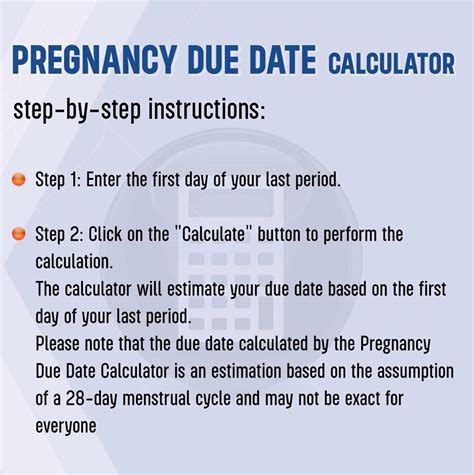
In conclusion, a pregnancy due date calculator is a valuable tool for expectant parents. By understanding how the calculator works and considering individual factors that can affect the due date, parents can get a reliable estimate of when their baby will arrive. Whether you're a first-time parent or an experienced one, using a pregnancy due date calculator can be a fun and exciting experience.
What's Next?
After using a pregnancy due date calculator, expectant parents can start preparing for the baby's arrival. This includes: * Scheduling prenatal appointments * Creating a birth plan * Preparing the nursery * Taking childbirth education classesHow accurate are pregnancy due date calculators?
+Pregnancy due date calculators are generally accurate, but they are not 100% reliable. Factors such as irregular menstrual cycles, conception date uncertainty, and gestational age uncertainty can affect the accuracy of the calculator.
What information do I need to use a pregnancy due date calculator?
+To use a pregnancy due date calculator, you will need to input the date of your last menstrual period (LMP) or the date of conception. Some calculators may also require additional information, such as the length of your menstrual cycle or the baby's gestational age.
Can I use a pregnancy due date calculator if I have an irregular menstrual cycle?
+Yes, you can use a pregnancy due date calculator even if you have an irregular menstrual cycle. However, the calculator may not be as accurate, and you should consult with your healthcare provider to determine the best way to estimate your due date.
We hope this article has provided you with valuable information about pregnancy due date calculators. If you have any questions or comments, please don't hesitate to reach out. Share this article with your friends and family, and don't forget to follow us for more informative content.
